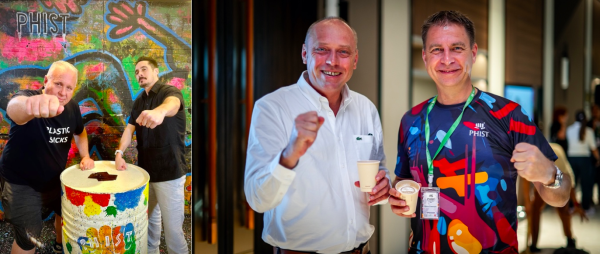PHUKET, 11 September 2023: Hotels and resorts around Southeast Asia fail to understand the “green premium” and how to leverage it to attract quality guests, according to leading figures in the region’s hospitality industry.
The message that hotels and resorts are falling behind counterparts in other parts of the globe when it comes to capitalising on the benefits associated with sustainable tourism was one of the major takeaways from PHIST (Phuket Hotels for Islands Sustaining Tourism), Southeast Asia’s largest sustainability forum, held this week at SAii Laguna where over 1,000 participants gathered.

But the strong showing of hoteliers ready to pledge a commitment to sustainability in their resort operations could be just lip service as very few actually identify projects in progress when you check their websites, including hotels owned by leaders of associations who should know better. There is still the tendency to greenwash. Actions speak louder than words, the latter being in no short supply at the hundreds of events hoteliers attend that preach sustainability as the holy grail to reach the hearts of travel consumers.
A word of warning did come from Bill Barnett, managing director of hospitality and real estate advisory group C9 Hotelworks, co-organiser of PHIST, together with Greenview and Phuket Hotels Association.
“Hotel developers in Southeast Asia have broadly failed to make sustainably a must as they do in Europe or North America. It’s a massive disconnect”.
Other expert speakers at PHIST included star designer Bill Bensley and KP Ho, the founder and executive chairman of Banyan Tree Holdings and Laguna Resorts and Hotels, who urged resort owners to become more conscious of the broader benefits associated with sustainable tourism.
There’s a long list of essential must-do items to start meaningful sustainable and environmental best practices, such as pioneering green or mindful practices ranging from waste management and energy conservation to farm-to-fork dining, sourcing organic produce from local farmers, and better community engagement.
But if they succeed, resorts will enhance their appeal to clients who place a premium value on experiences that are ethical, sustainable, and — perhaps most importantly — unique. But it must be genuine, which is questionable in an industry where the bottom line dominates the financial conversation every quarter.
STR Global’s area director for Asia Pacific, Jesper Palmqvist hosted a roundtable at PHIST where figures from top resort names such as Six Senses and Soneva discussed environmental best practices moving forward. He agreed that the hospitality industry in Southeast Asia needs to be more proactive about enacting meaningful changes.
“It’s important that the industry develops green champions, best practice documents and training modules that hotels can modify,” he said. “Furthermore, hotels need to be pressured into fulfilling international sustainability certification. This would show more ambition to adopt new criteria relating to the environment and thus stay ahead of the curve.”
Gaining a recognised certification is just the start of a game plan to win the confidence of the new-gen traveller. Without it, you rely on a sales pitch that often lacks substance when we quote the global sustainable tourism goals. Travellers deserve an independent certification when considering their next holiday stay.
Other discussions about ways to seize the opportunities afforded by sustainable tourism were to the fore as some of the biggest names in the region’s hospitality sector gathered for PHIST.
Banyan Tree founder KP Ho was instrumental in transforming Laguna Phuket from a barren moonscape of scarred land—abandoned by the tin mining industry and declared uninhabitable by the UN—into Southeast Asia’s leading integrated resort development.
Bill Bensley has helped curate some of Asia’s most charismatic sustainable tourism experiences. For example, his Shinta Mani Wild in Cambodia offers luxury, tented accommodation while using funds to preserve its surrounding private nature sanctuary from poaching, mining, and logging.
Workshop discussion covered issues such as the circular sustainable economy, green hotel loans and start-up funds, glamping, farm-to-table cuisine, environmental hospitality design, data and measurement, Greentech innovation, marketing sustainable hotels, water conservation and sustainable wellness.
Directly preceding PHIST, outdoor lodging practitioners gathered and agreed upon the formation of the Asia Pacific Outdoor Lodging Association (APOLA), a trade body set up to guide, promote and structure the development of the outdoor lodging sector in the region as it expands.
APOLA’s mission will be to help define the standards for the region, raise awareness, develop an accounting system for project financing and educate the industry about the advantages of this lower-impact, sustainable hospitality model. Interested developers, owners and managers in the sector are invited to submit their interest to join the association by contacting APOLA at [email protected]







